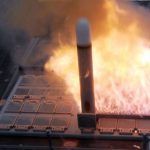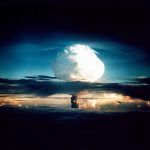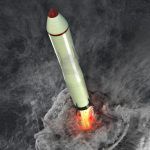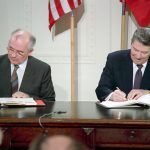How to save the INF Treaty (and arms control): Invite China
By Petr Suchy, Bradley A. Thayer | July 7, 2015
 Putin meeting with Trump on sidelines of G20 meeting in Hamburg on July 7, 2017. Credit: Kremlin Presidential Executive Office
Putin meeting with Trump on sidelines of G20 meeting in Hamburg on July 7, 2017. Credit: Kremlin Presidential Executive Office
What should we do, now that Russia is suspected of violating the 1987 Intermediate-Range Nuclear Force Treaty?
Also known as the INF Treaty, it was one of the symbols that marked the end of the Cold War, and a tremendous achievement in the improvement of relations between states. The treaty prohibited the United States and the Soviet Union from producing and deploying land-based ballistic or cruise missiles of intermediate range, defined by as between 500 and 5,500 kilometers. As a result, the United States withdrew and destroyed its Pershing II Intermediate Range Ballistic Missiles (IRBMs) and ground-based cruise missiles, and the Soviets did the same with their SS-20 IRBMs and other systems that fell into this class of missiles. This was a major success for arms control and marked a significant improvement in the Soviet-American relationship: The superpowers had agreed to eliminate an entire class of weaponry worldwide, and robust verification measures ensured confidence in the treaty. It was a remarkable achievement. After almost thirty years, the INF Treaty remains in force, although some unfortunate developments have cast a shadow over it.
Bringing in China to save the INF Treaty. The darkest cloud over the treaty is its apparent violation by Russia, which the Obama administration states had happened in 2014. The nature of the violation was a Russian test of a ground-launched cruise missile, the R-500, which the administration says fell within the prohibited range—although some analysts, such as Pavel Podvig, say that “the information on the violation is extremely thin” and consider it more of a technicality about the nature of being “fully treaty-compliant.” Nevertheless, the Obama administration’s acknowledgement that the Russians have violated the treaty introduces three options: The United States could ignore the violation in an effort to sustain the relationship with Russia and the treaty; it could leave the treaty due to the other party’s violation; or it could work to meet Russian security concerns by making the INF Treaty multilateral.
Of these options, making the treaty multilateral is the best alternative. Simply ignoring Russian cheating on the INF Treaty would send a bad signal to both the Russians and NATO allies. It would also seriously weaken arms control in general.
And US withdrawal from the treaty would be a mistake. It would send a significant negative signal about the standing of the relationship—already in jeopardy due to Russia’s seizure of Crimea and its aggression towards Ukraine—and diminish relations at a perilous time. It would also cast a pall over the future prospects for arms control and confidence-building measures in Europe. Moreover, as a practical matter, the United States does not have adequate land-based weaponry to match a possible Russian IRBM or cruise missile deployment in Europe, which might damage Washington’s relations with European members of NATO.
Given these dire alternatives, the treaty should become a multilateral one, to include other states. This would save it and the prospects for arms control.
While all states in possession of land-based missiles in the INF range would be welcome to join, the key player is China, because Russia’s actions were likely in part because of its security concern with that country. For example, Russian Deputy Defense Minister Anatoly Antonov had pointedly stressed that the the situation regarding the proliferation of these systems had changed dramatically since 1987—and emphasized that a vast number of the new owners of such systems are located near Russia.
As Alexei Arbatov and Vladimir Dvorkin argue: “China must be taken into consideration when discussing subsequent U.S.-Russian initiatives on arms limitations and reductions.” They also expect that China “would join the disarmament process only if its concessions regarding transparency and weapons limitations are offset by U.S. and Russian concessions.” Echoing this concern is Russian security analyst Petr Topychkanov, who submits that “Russia is interested in greater transparency in China’s nuclear arsenal” and points out that despite the ongoing crisis between Russia and the United States, in a longer term perspective “Russia could find common ground with the United States when it comes to China.” (The Chinese view of all this can be seen in an article that appeared in the China Institute of International Studies, titled “Does China’s rise pose a threat to Russia?”)
China’s accession to the treaty would have a substantial stabilizing effect, in light of the proliferation of Chinese IRBMs and growing Russian concerns. Were China to join, Russia would have an added incentive to remain within the treaty, as the intermediate class of land-based missile systems would stay banned. While not a perfect solution, it would allow the treaty to be saved. Naturally, this proposal raises other related questions, especially about whether such a scenario is feasible, and how the INF Treaty might become multilateral.
It is important to acknowledge that if there is an attempt to involve other parties in diplomatic talks on this issue, that would be one of the most challenging aspects of arms control negotiations. Never in the history of arms control has a bilateral treaty of such significance been transformed successfully into a multilateral one. (Although, admittedly, the 1991 START I Treaty was originally bilateral and became multilateral as a result of the demise of the Soviet Union—after which Russia, Belarus, Kazakhstan, and Ukraine became members.) But despite the obstacles, the INF Treaty could evolve in a more structured process, developing in stages.
The central difficulty here is the dangerous security situation in Asia, particularly the tensions between China and Japan, and between China and India. To move forward, it is necessary for Russia and the United States to approach and engage China directly on these issues. This step would recognize Beijing’s special status and its importance as a growing force in international politics; it would also be based on a realistic assessment of the likely strong resistance such a proposal would meet from other regional players, such as India and Pakistan.
There is an applicable precedent: the 1970 Nuclear Non-Proliferation Treaty (NPT). It took two decades for China to become an official party to the NPT, but China took this important step despite the conduct of other regional players such as India and Pakistan, who remain outside of the NPT regime to this day. In addition, China should probably be brought into the INF because China certainly has the diplomatic, economic, and military means to further its goals and ambitions, even without its land-based intermediate-range missile forces. In essence, Beijing’s continuing buildup of strategic nuclear forces as well as non-nuclear weapon systems make it a country which should be brought into the fold.
A multilateral INF serves the objectives of arms control. For arms control theorists, there are traditionally three major objectives of arms control, which were most famously elucidated by Bernard Brodie in the mid-1970s. The first is that arms control promotes stability in relations between states, because a state shows restraint by making an effort to improve relations: It willingly limits or yields a class of weapons to demonstrate to others that its ambitions are limited, thereby showing acceptance of the status quo. Second, a state seeks to minimize the cost of war (should it occur) through the reduction in armaments. Third—and for Brodie, the most pragmatic objective—was that arms control would permit reductions in defense spending.
Given China’s increasing strength, China might be persuaded to gradually diminish its land based intermediate-range capabilities through diplomacy and positive inducements. For example, Russia and the United States might propose to China that it agree to freeze the numbers of Beijing’s intermediate-range missile carriers in its inventory for a period of time, and then cut this force to zero within a negotiated timeframe. To alleviate possible Chinese concerns, Russia and the United States might pledge not to violate or leave the INF Treaty. Furthermore, as both Moscow and Washington have limited their strategic forces within the parameters of the New START Treaty, China could have confidence that their strategic force will not increase. Of course, in time, other states might join as well.
In turn, joining the INF Treaty would allow China to enjoy the benefits of arms control. Given present Asian tensions, New Delhi, Hanoi, Manila, and Tokyo are suspicious of China’s possible territorial ambitions in the East and the South China Seas, and along the Sino-Indian border. There is a strong legacy of mistrust, and the possibility of arms races, crises, and intense security competition is significant. Were China to sign the INF Treaty, it would demonstrate its support for stability and acceptance of international norms. China would show that it accepts the value of arms control and seeks confidence-building measures, which would aid stability and demonstrate that China is a status quo power.
Fundamentally, acceding to the INF Treaty would accomplish one of the major objectives of arms control: It would allow China to signal its peaceful intentions. In turn, this could have an important stabilizing effect on states concerned with China’s increasing power. Chinese membership in the INF would permit the Treaty to remain in force and address Russia’s security concerns about China to a considerable degree.
This is especially important, given China’s tremendous growth in economic and military power, and the demonstrable concern by states throughout all of Asia about China’s aims and objectives now and in the future, when China is likely to become even more powerful. China’s neighbors—Russia to be sure, but also the neighboring states of India, Japan, and Taiwan—would be reassured by China’s acceptance of the INF Treaty. This is not to claim that arms races will be prevented altogether, or that there will not be other problems that result from China’s growth. But this act would be a major step forward for China, opening the door to further arms controls agreements and the possibility of reducing tensions in all Asia.
Three problems from the Chinese perspective. While China should join, there are three major problems from Beijing’s perspective that will generate some resistance. First, China will have to give up a large number of missiles presently deployed against Taiwan, India, and other states. That is a significant cost to Beijing. China has some 450 nuclear-armed intermediate range ballistic and cruise missiles aimed at Russia, India, and Taiwan. It cannot easily replace these forces with aircraft or other systems.
Second, were China to join, Russia may remain outside or elect to violate the INF Treaty again, and that would influence Beijing’s decision-making.
Third, neighboring states—most notably, Japan, India, and Vietnam—would remain outside of the INF Treaty, and so would be free to develop their own intermediate-range arsenals. Simply put, there would be direct costs to China, and its hands would be bound by the INF Treaty requirements.
Of course, that is precisely the advantage of arms control. The value of demonstrating that China supports the status quo is in China’s long-term national security interests, and will promote stability in international politics. In turn, this will provide China with more security than could be provided by intermediate-range forces. Conveying that it is a status quo power, and one that is willing to forsake its immediate advantage in a particular category of weapon system for longer-term security, would be supremely helpful. It would dampen the risks of conflict and security competition. At this time, China has the opportunity to demonstrate it shares the value of arms control and its role in maintaining stability in international politics.
What next? The contribution of arms control to the stability of international politics is significant. As theorists have identified, arms control is stabilizing because it allows states to signal their benign motives and their acceptance of major norms, such as swearing off the use of force to change the status quo. By maintaining the INF Treaty, Russia and the United States show that they are interested in maintaining international stability, and that they perceive arms control to be a key element of it.
By accepting the INF Treaty, China can demonstrate its increasing acceptance of international norms and its intent to be a status quo power. Arms control can play a stabilizing role in the Sino-Russian-American relationship, just as it did during the Cold War. The potential is there for the future of arms control to meet its objectives and thereby contribute to a stable international order, founded on binding and transparent agreements in the strategic realm rather than dangerous nuclear competition.
Together, we make the world safer.
The Bulletin elevates expert voices above the noise. But as an independent nonprofit organization, our operations depend on the support of readers like you. Help us continue to deliver quality journalism that holds leaders accountable. Your support of our work at any level is important. In return, we promise our coverage will be understandable, influential, vigilant, solution-oriented, and fair-minded. Together we can make a difference.
Share: [addthis tool="addthis_inline_share_toolbox"]














